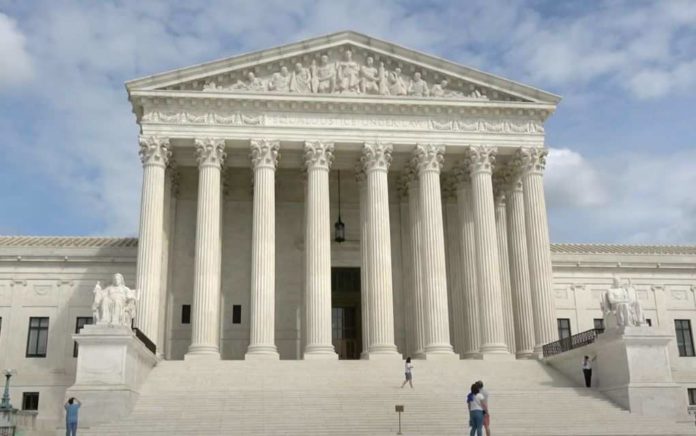
Donald Trump wants to create a lasting legacy. One goal remains on his mind and elusive.
That’s why the Trump admin is preparing to bring this huge elections case before the U.S. Supreme Court.
Trump Administration’s Census Push Could Force Supreme Court to Confront Noncitizen Voting Power
The Trump administration is gearing up for a move to reshape the U.S. census, aiming to exclude noncitizens from the count used to apportion congressional seats and Electoral College votes. This effort, which could redefine political representation, may finally compel the Supreme Court to rule on the contentious issue of whether noncitizens should influence the nation’s electoral map. The administration’s strategy, rooted in a commitment to prioritizing citizens’ voting power, is poised to spark a legal and political showdown.
White House Deputy Chief of Staff Stephen Miller, a key architect of the administration’s immigration policies, signaled last month a renewed focus on this issue. “We’re going to clean up the census and make sure that illegal aliens are not counted,” Miller said, emphasizing the administration’s intent to address what it sees as an unfair allocation of political power. With Commerce Secretary Howard Lutnick leading the charge, the administration is exploring multiple avenues to achieve this goal, leveraging both executive authority and legislative support.
One potential path involves the Commerce Department, under Lutnick’s leadership, proposing a census question to differentiate citizens, legal permanent residents, and unauthorized immigrants. A lawsuit filed by Republican-led states and the Department of Commerce in January 2025 suggests this approach, which could allow the exclusion of noncitizens from apportionment counts without altering the overall population tally. Such a move would align with the administration’s argument that noncitizens dilute the political influence of American citizens.
Republican momentum for this policy is gaining traction in Congress. Rep. Chuck Edwards, R-N.C., and Sen. Bill Hagerty, R-Tenn., have introduced bills to mandate a citizenship question and exclude noncitizens from apportionment counts. “The plain reading of the [constitutional] text is clear as day, and the original purposes have been carefully articulated and never rebutted,” said Rep. Jamie Raskin in 2020, opposing similar efforts, though Republican lawmakers argue that the Constitution’s language allows for flexibility in defining “persons” for apportionment purposes. With a GOP-controlled Congress, these bills stand a stronger chance of passing than in 2020, when a similar House bill passed 206-202 but stalled in the Democratic-controlled Senate.
On his first day in office, January 20, 2025, President Donald Trump rescinded a Biden-era executive order that reaffirmed counting all residents, regardless of immigration status. “President Trump has repeatedly tried — and failed — to weaponize the census for his attacks on immigrant communities,” said ACLU lawyer Dale Ho in 2020, criticizing earlier attempts. Yet, with a Republican Congress and preparations for the 2030 census underway, the administration faces less resistance this time. Federal law requires proposed census questions to be submitted to Congress by 2028, giving Trump a critical window to shape the process.
The stakes are high, particularly for states with large noncitizen populations. According to recent Department of Homeland Security data, California leads with an estimated 2.6 million illegal aliens, followed by Texas with 2.06 million, Florida with 560,000, New York with 540,000, and New Jersey with 440,000. These numbers could significantly influence apportionment, potentially shifting congressional seats and Electoral College votes to states with fewer noncitizens if the policy is implemented.
California, despite its large noncitizen population, lost a congressional seat after the 2020 census due to a net outmigration of 341,866 citizens in 2023, as reported by the Orange County Register. Thad Kousser, a political science professor at UC San Diego, predicts California could lose four more seats by 2030 if current trends persist, even without changes to census criteria. Conversely, Texas and Florida could gain three seats each, amplifying their political influence if noncitizens are excluded from apportionment counts.
The Trump administration’s first attempt to exclude noncitizens from the 2020 census apportionment count ignited fierce debate. In July 2020, Trump issued a memorandum directing the Census Bureau to use administrative records to identify and exclude undocumented immigrants, arguing that including them constitutes voter suppression by diluting citizens’ political power. “The administration pointed to Franklin v. Massachusetts to support its claims,” noted a 2025 RealClearInvestigations report, referencing a 1992 Supreme Court ruling that affirmed presidential discretion in census policy decisions.
Opponents, including blue states, sanctuary cities, and immigrant advocacy groups, swiftly challenged the memorandum, arguing it violated the Constitution’s mandate to count “the whole number of persons in each State.” They claimed the policy would discourage immigrant participation, leading to undercounts in communities with large noncitizen populations. Federal courts in California, Maryland, and New York ruled against the administration, citing constitutional and legal violations.
The Supreme Court, in December 2020, blocked Trump’s plan, deeming it premature and lacking sufficient justification. “Where, as here, the government acknowledges it is working to achieve an allegedly illegal goal, this court should not decline to resolve the case simply because the government speculates that it might not fully succeed,” wrote Justice Stephen Breyer in a dissenting opinion. However, the Court sidestepped a definitive ruling on the merits, leaving the door open for future challenges.
The administration’s renewed push could force the Supreme Court to confront the issue head-on. By leveraging a GOP-controlled Congress and the Commerce Department’s authority, Trump may succeed in framing noncitizen inclusion as a distortion of democratic representation. The administration’s argument hinges on the Constitution’s flexibility, asserting that “persons” can be interpreted to exclude those without legal ties to the state, as supported by historical exclusions like “Indians not taxed.”
Critics argue that excluding noncitizens would upend centuries of precedent, as every census since 1790 has included all residents, regardless of status. “The use of total population was again affirmed in 1964 when the U.S. Supreme Court ruled in Wesberry v. Sanders,” noted a 2025 Common Cause report, emphasizing the constitutional requirement for equal representation based on total population. Yet, supporters, including conservative legal scholar John Eastman, argue that the Declaration of Independence’s “consent principle” implies only citizens should count for apportionment.
The administration’s strategy could also involve amending the Census Act to redefine apportionment criteria or mandate citizen-only data. With Republican support, such legislation could gain traction, especially given the failure of similar efforts in 2020 due to a Democratic Senate. The 2019 Supreme Court ruling, which rejected a citizenship question for procedural reasons, suggested Congress could authorize such a question, providing a potential legal pathway.



















